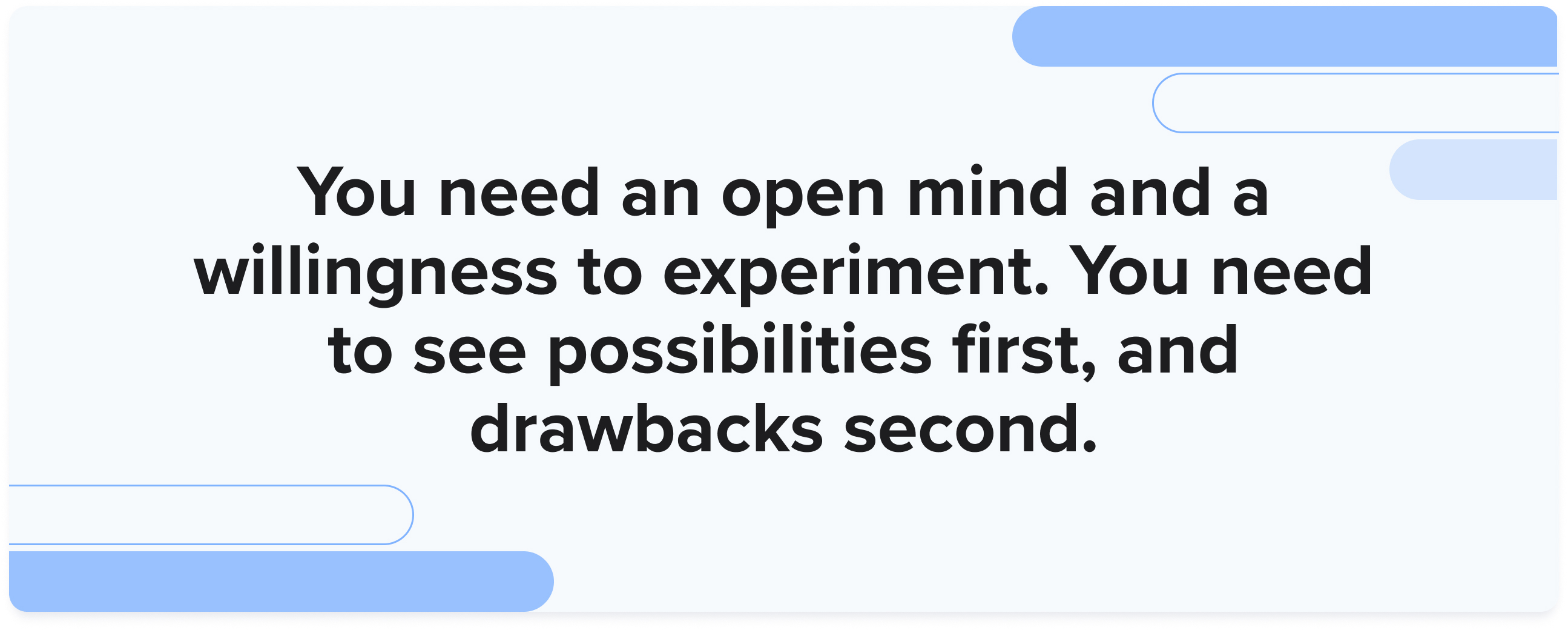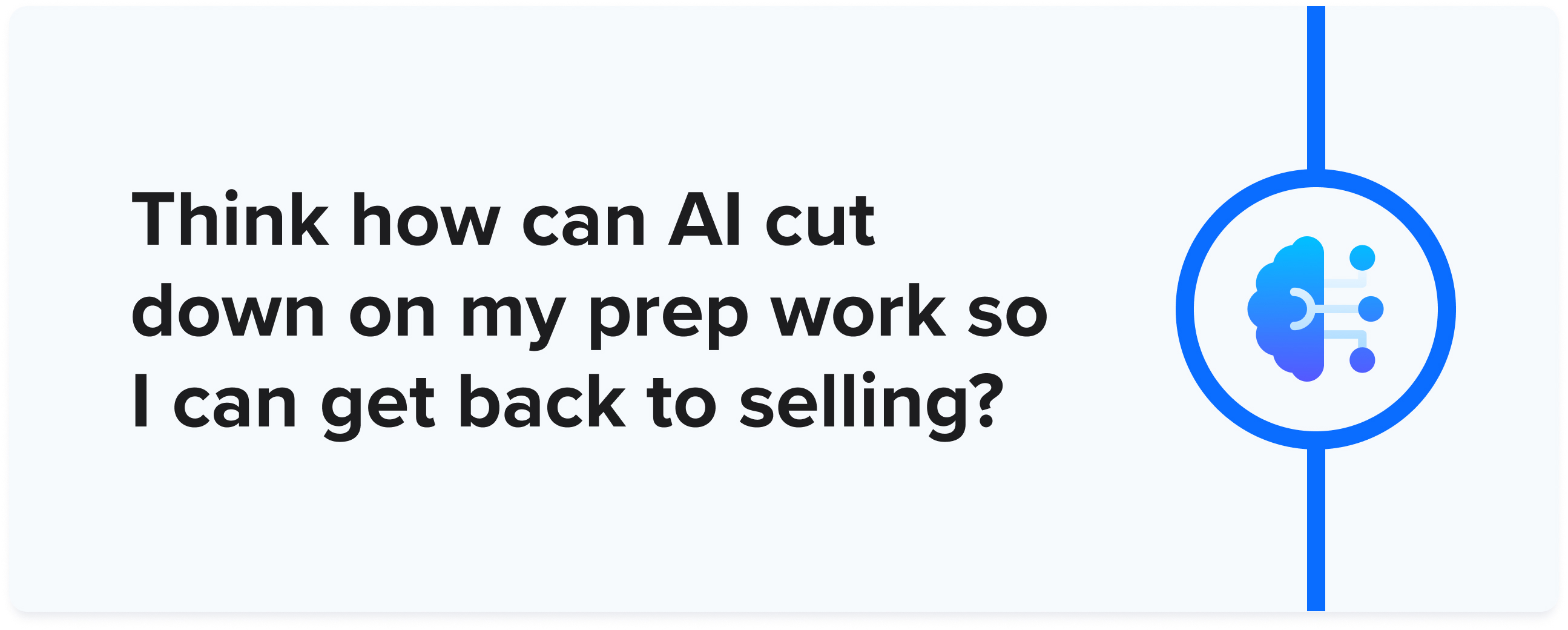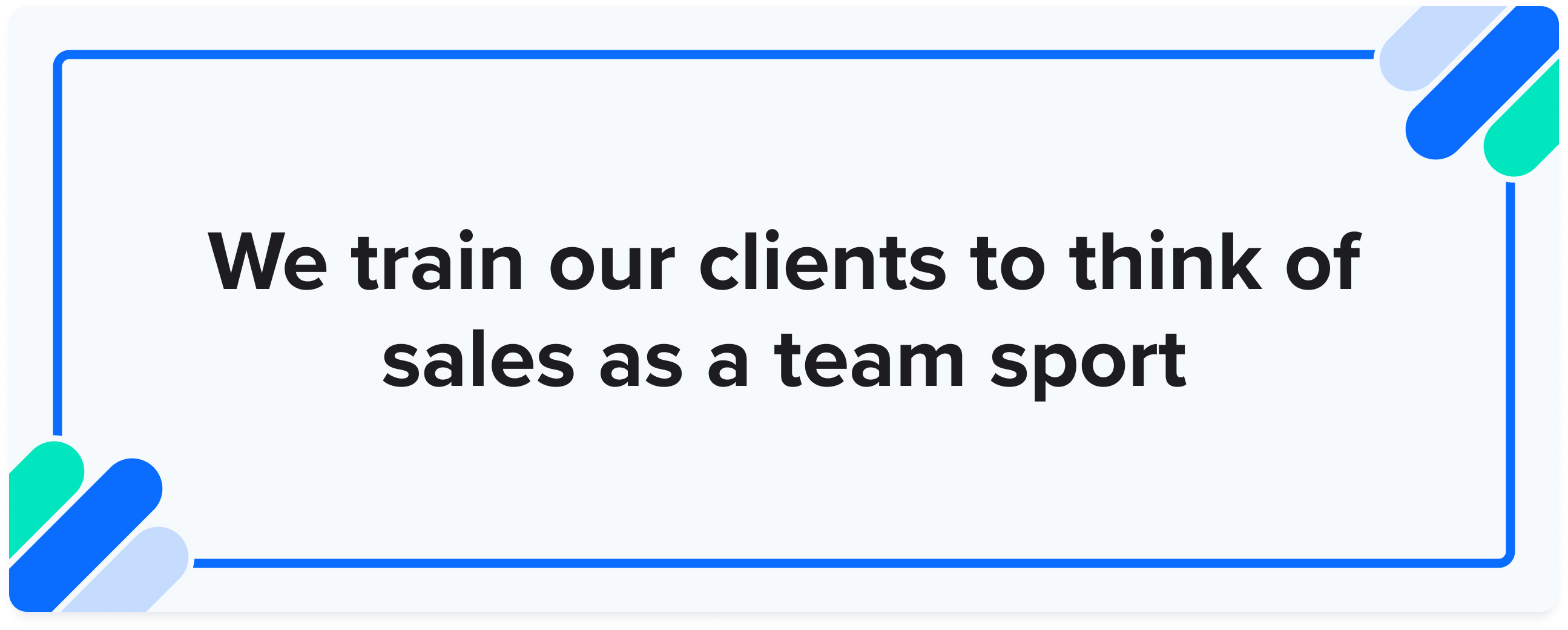As I’ve written before, the key to smart AI adoption is not prompt practicing or tool tutorials. Instead, I believe it’s about a mindset. It’s about a willingness to embrace, not shun, the technology so you can see the novel ways it can impact your work.
When I advise sales managers on how they can use AI to their benefit, my first piece of advice is always the same: You need an open mind and a willingness to experiment. You need to see possibilities first, and drawbacks second.

Having worked closely with my share of sales managers, I know that they’re underappreciated. They’re often blamed for their teams’ shortcomings, but they often don’t have as much influence over these outcomes as you might think.
I also believe sales managers are often overworked, which brings us to our subject today. For those overworked, underappreciated sales managers, AI can be the helpful sidekick they’ve always longed for. The benefits of AI adoption are considerable, both for sales managers and sales reps themselves.
Before we talk about managers, let’s quickly review how AI can be a game changer for salespeople.
Note: As we get into this, know that we get no compensation for any of the tools we mention below. These are honest reviews from the front lines of the AI revolution.
AI as a tool for sales reps
According to a famous report from a few years ago, salespeople only spend about 37% of their time selling. The rest gets filled up with meetings, email, prospecting, research, and training.
AI technology can be an incredible multiplier for salespeople, helping them streamline the tediousness and monotony of some of their least favorite tasks so they can spend more time selling.
For a few examples of what I mean, think about these use cases:
- Call review with AI. AI tools like Gong and Chorus will automatically record and sort your Zoom calls, and then provide detailed insights that range from the high level (think: how much time did I have my slide deck up during that one-hour meeting?) to the specific (how clearly did I articulate the ‘next steps’ at the end of the call?)
- Role-play with AI. We all know that role-plays work — and we all know that people often don’t like doing them. With a few prompts, you can create a basic role-play scenario with ChatGPT.
- Ask for feedback on a presentation. If you’ve been staring at the same text for an hour, AI can see your work with fresh eyes. Put the text from your slides into a chat and ask for feedback. Are there holes in your logic? Do you belabor certain points? Let a tool read the slide deck before you show it to a client.
- Use an AI slide builder to create a rough draft presentation that you can fine-tune. I use Slides AI.
- Research a company’s website. If you don’t have time to pore over dozens of pages, ask AI to do it. Use a ChatGPT plugin to access the internet and put in a company’s URL. It will come back with takeaways you can research further.
- Write outreach emails much quicker than before. If you train AI on your voice and style, smart composers like Grammarly or Jasper can crank out emails that you’ll just need to polish.
These ideas are by no means exhaustive, but they give you an idea of some possibilities. The key, as I said before, is to bring a mindset where you apply AI to every situation. Think, how can AI help me do this faster or better?

Or, more aptly, how can AI cut down on my prep work so I can get back to selling? With AI, salespeople can focus more on the work that matters most.
AI for sales managers
But our focus today is not so much on sales reps themselves as on their managers. On top of everything listed above, sales managers can use AI to help them evaluate their teams’ performance and provide training to help them improve.
Here’s how.
Use AI to evaluate your team
Most sales managers have a regular 1-1 and pipeline review meeting with each sales rep, usually once or twice a month.
If you’re a sales manager, how do you prepare for that meeting? By checking the CRM, seeing closed/lost and closed/won, and maybe watching a sales call recording.
That’s not really enough, but that’s all you’ve got time for. After all, you’ve got a bunch of other reps you’re managing, too.
You just hope that one call you watched was a representative sample of their work so that you can give helpful feedback.
Enter AI.
With a tool like Chorus or Gong, you can have AI watch every call that rep had this month — and draw meaningful conclusions for you.
Did they tend to dominate their meetings with a heavy-handed pitch?
Were the next steps always made clear in each meeting?
Did they encourage discussion from all stakeholders?
All of a sudden, you’re not looking at isolated incidents. You’re looking at their whole month of work. Your feedback will now be so much better.
To get a glimpse of what these two tools can do, check out this quick overview of Chorus, (which was acquired by ZoomInfo in 2021):
And here’s a brief rundown from Gong.
(And just to lay all our cards on the table, here at IMPACT we started out using Gong, then switched to Chorus, which was a much cheaper option. We’re currently checking out a free trial of Gong to see if we should switch back.)
The beauty of these tools is that they can aggregate call data to provide feedback. Now, they don’t remove the onus of watching at least one sales call per rep per meeting, but you no longer have to base all of your feedback on a single call.
If you don’t have either Chorus or Gong, you can still throw transcripts into ChatGPT and ask for feedback. That’s a bit more labor intensive, though.
Once you have your insights, it’s time to put them to work.
Use AI to train your team
So, what do you do with all this information? You help your team improve — but not only as individuals. You can now help the whole team improve in ways you never could before.
At IMPACT, we train our clients to think of sales as a team sport. Although individual reps are compensated for the deals they close, the only way for the entire company to improve is for the sales team to work together. Boosting your total team performance will be more beneficial than letting the gap widen between the top and the bottom.

When you have AI-powered insights, you can implement training scenarios tailored to your reps’ needs.
- Ali and Jason: You’re both working on setting the tone at the beginning of meetings. Pair up and roleplay a few discovery call scenarios.
- Trish, Jamal, and Steve: You three are taking up too much meeting time with your own talking. I want you three to practice asking better questions and develop your active listening skills.
You get the idea.
With aggregate data, you can run purposeful group training sessions focused on the unique needs of your team.
The first step toward training your team is understanding their performance
None of this is possible without the sales call recordings. None of this is possible without psychological safety.
If your sales team doesn’t want to record its sales calls because it fears micromanagement or punishment, you need to first build the trust necessary to assuage these objections.
Help your team see that AI can be a boon to their skill set, not a threat to their future.
And when the data starts rolling in — with recordings and AI analysis — treat this moment like the touchstone it is. Not just nitpick and criticize. Use your position to celebrate successes and recognize great effort. Empower your team to help each other. Build a spirit of collegiality and support, not of one-upmanship.
If you build the right culture, the tools can do wonders.
If you don’t know how to, reach out to us at IMPACT.



